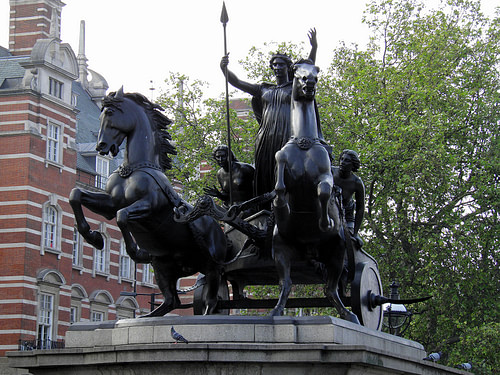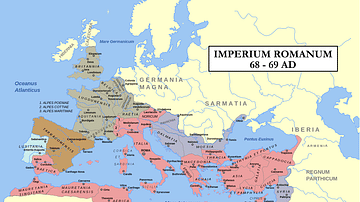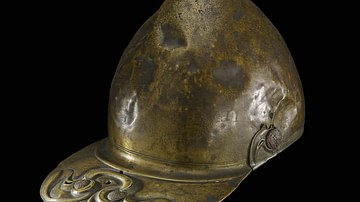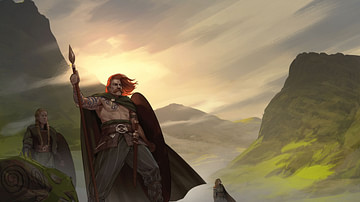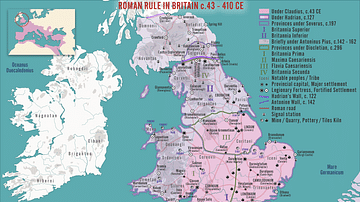Tacitus (full name, Publius Gaius Cornelius Tacitus, ca. 56 – ca. 117 CE) was a Roman Senator and an important historian of the Roman Empire. In the following passages Tacitus gives an account of the Iceni Queen Boudicca's revolt against Rome, 60-61 CE.
Causes of Boudicca's Revolt
Chapter 31
Prasutagus, the late king of the Icenians, in the course of a long reign had amassed considerable wealth. By his will he left the whole to his two daughters and the emperor in equal shares, conceiving, by that stroke of policy, that he should provide at once for the tranquility of his kingdom and his family.
The event was otherwise. His dominions were ravaged by the centurions; the slaves pillaged his house, and his effects were seized as lawful plunder. His wife, Boudicca, was disgraced with cruel stripes; her daughters were ravished, and the most illustrious of the Icenians were, by force, deprived of the positions which had been transmitted to them by their ancestors. The whole country was considered as a legacy bequeathed to the plunderers. The relations of the deceased king were reduced to slavery.
Exasperated by their acts of violence, and dreading worse calamities, the Icenians had recourse to arms. The Trinobantians joined in the revolt. The neighboring states, not as yet taught to crouch in bondage, pledged themselves, in secret councils, to stand forth in the cause of liberty. What chiefly fired their indignation was the conduct of the veterans, lately planted as a colony at Camulodunum. These men treated the Britons with cruelty and oppression; they drove the natives from their habitations, and calling them by the [shameful] names of slaves and captives, added insult to their tyranny. In these acts of oppression, the veterans were supported by the common soldiers; a set of men, by their habits of life, trained to licentiousness, and, in their turn, expecting to reap the same advantages. The temple built in honour of Claudius was another cause of discontent. In the eye of the Britons it seemed the citadel of eternal slavery. The priests, appointed to officiate at the altars, with a pretended zeal for religion, devoured the whole substance of the country. To over-run a colony, which lay quite naked and exposed, without a single fortification to defend it, did not appear to the incensed and angry Britons an enterprise that threatened either danger or difficulty. The fact was, the Roman generals attended to improvements to taste and elegance, but neglected the useful. They embellished the province, and took no care to defend it.
Omens & early Roman setbacks at Camulodunum
Chapter 32.
While the Britons were preparing to throw off the yoke, the statue of victory, erected at Camulodunum, fell from its base, without any apparent cause, and lay extended on the ground with its face averted, as if the goddess yielded to the enemies of Rome. Women in restless ecstasy rushed among the people, and with frantic screams denounced impending ruin. In the council-chamber of the Romans hideous clamours were heard in a foreign accent; savage howlings filled the theatre, and near the mouth of the Thames the image of a colony in ruins was seen in the transparent water; the sea was purpled with blood, and, at the tide of ebb, the figures of human bodies were traced in the sand. By these appearances the Romans were sunk in despair, while the Britons anticipated a glorious victory. Suetonius, in the meantime, was detained in the isle of Mona. In this alarming crisis, the veterans sent to Catus Decianus, the procurator of the province, for a reinforcement. Two hundred men, and those not completely armed, were all that officer could spare. The colony had but a handful of soldiers. Their temple was strongly fortified, and there they hoped to make a stand. But even for the defense of that place no measures were concerted. Secret enemies mixed in all their deliberations. No fosse was made; no palisade thrown up; nor were the women, and such as were disabled by age or infirmity, sent out of the garrison. Unguarded and unprepared, they were taken by surprise, and, in the moment of profound peace, overpowered by the Barbarians in one general assault. The colony was laid waste with fire and sword.
The temple held out, but, after a siege of two days, was taken by storm. Petilius Cerealis, who commanded the ninth legion, marched to the relief of the place. The Britons, flushed with success, advanced to give him battle. The legion was put to the rout, and the infantry cut to pieces. Cerealis escaped with the cavalry to his entrenchments. Catus Decianus, the procurator of the province, alarmed at the scene of carnage which he beheld on every side, and further dreading the indignation of a people, whom by rapine and oppression he had driven to despair, betook himself to flight, and crossed over into Gaul.
Suetonius abandons London to the Boudiccan forces
Chapter 33.
Suetonius, undismayed by this disaster, marched through the heart of the country as far as London; a place not dignified with the name of a colony, but the chief residence of merchants, and the great mart of trade and commerce. At that place he meant to fix the feat of war; but reflecting on the scanty numbers of his little army, and the fatal rashness of Cerealis, he resolved to quit the station, and, by giving up one post, secure the rest of the province. Neither supplications, nor the tears of the inhabitants could induce him to change his plan. The signal for the march was given. All who chose to follow his banners were taken under his protection. Of all who, on account of their advanced age, the weakness of their sex, of the attractions of the situation, thought proper to remain behind, not one escaped the rage of the Barbarians. The inhabitants of Verulamium, a municipal town, were in like manner put to the sword. The genius of a savage people leads them always in quest of plunder; and, accordingly, the Britons left behind them all places of strength. Wherever they expected feeble resistance, and considerable booty, there they were sure to attack with the fiercest rage. Military skill was not the talent of Barbarians. The number massacred in the places which have been mentioned, amounted to no less than seventy thousand, all citizens or allies of Rome. To make prisoners, and reserve them for slavery, or to exchange them, was not in the idea of a people, who despised all the laws of war. The halter and the gibbet, slaughter and defoliation, fire and sword, were the marks of savage valour. Aware that vengeance would overtake them, they were resolved to make sure of their revenge, and glut themselves with the blood of their enemies.
Suetonius prepares to counterattack
Chapter 34.
The fourteenth legion, with the veterans of the twentieth, and the auxiliaries from the adjacent stations, having joined Suetonius, his army amounted to little less than ten thousand men. Thus reinforced, he resolved, without loss of time, to bring on a decisive action. For this purpose he chose a spot encircled with woods, narrow at the entrance, and sheltered in the rear by a thick forest. In that situation he had no fear of an ambush. The enemy, he knew, had no approach but in front. An open plain lay before him. He drew up his men in the following order: the legions in close array formed the center; the light armed troops were stationed at hand to serve as occasion might require: the cavalry took post in the wings. The Britons brought into the field an incredible multitude. They formed no regular line of battle. Detached parties and loose battalions displayed their numbers, in frantic transport bounding with exultation, and so sure of victory, that they placed their wives in wagons at the extremity of the plain, where they might survey the scene of action, and behold the wonders of British valour.
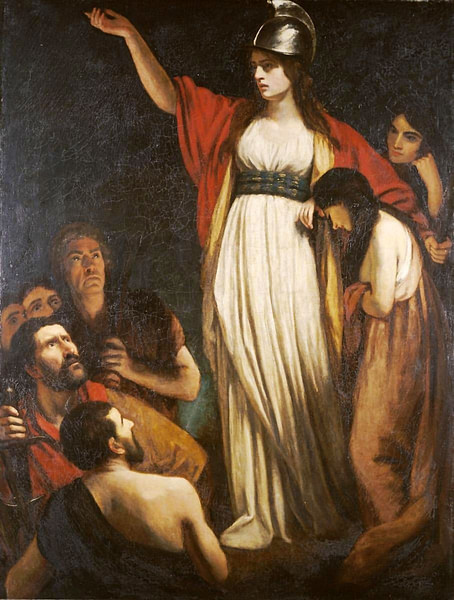
Boudicca addresses her army
Chapter 35.
Boudicca, in a [chariot], with her two daughters before her, drove through the ranks. She harangued the different nations in their turn: "This," she said, "is not the first time that the Britons have been led to battle by a woman. But now she did not come to boast the pride of a long line of ancestry, nor even to recover her kingdom and the plundered wealth of her family. She took the field, like the meanest among them, to assert the cause of public liberty, and to seek revenge for her body seamed with ignominious stripes, and her two daughters infamously ravished. From the pride and arrogance of the Romans nothing is sacred; all are subject to violation; the old endure the scourge, and the virgins are deflowered. But the vindictive gods are now at hand. A Roman legion dared to face the warlike Britons: with their lives they paid for their rashness; those who survived the carnage of that day, lie poorly hid behind their entrenchments, meditating nothing but how to save themselves by an ignominious flight. From the din of preparation, and the shouts of the British army, the Romans, even now, shrink back with terror. What will be their case when the assault begins? Look round, and view your numbers. Behold the proud display of warlike spirits, and consider the motives for which we draw the avenging sword. On this spot we must either conquer, or die with glory. There is no alternative. Though a woman, my resolution is fixed: the men, if they please, may survive with infamy, and live in bondage."
Suetonius meanwhile addresses his army
Chapter 36.
Suetonius, in a moment of such importance, did not remain silent. He expected every thing from the valour of his men, and yet urged every topic that could inspire and animate them to the attack. "Despise," he said, "the savage uproar, the yells and shouts of undisciplined Barbarians. In that mixed multitude, the women out-number the men. Void of spirit, unprovided with arms, they are not soldiers who come to offer battle; they are bastards, runaways, the refuse of your swords, who have often fled before you, and will again betake themselves to flight when they see the conqueror flaming in the ranks of war. In all engagements it is the valour of a few that turns the fortune of the day. It will be your immortal glory, that with a scanty number you can equal the exploits of a great and powerful army. Keep your ranks; discharge your javelins; rush forward to a close attack; bear down all with your bucklers, and hew a passage with your swords. Pursue the vanquished, and never think of spoil and plunder. Conquer, and victory gives you everything."
This speech was received with warlike acclamations. The soldiers burned with impatience for the onset, the veterans brandished their javelins, and the ranks displayed such an intrepid countenance, that Suetonius, anticipating the victory, gave the signal for the charge.
The decisive battle
Chapter 37.
The engagement began. The Roman legion presented a close embodied line. The narrow defile gave them the shelter of a rampart. The Britons advanced with ferocity, and discharged their darts at random. In that instant, the Romans rushed forward in the form of a wedge. The auxiliaries followed with equal ardour. The cavalry, at the same time, bore down upon the enemy, and, with their pikes, overpowered all who dared to make a stand. The Britons betook themselves to flight, but their waggons in the rear obstructed their passage. A dreadful slaughter followed. Neither sex nor age was spared. The cattle, falling in one promiscuous carnage, added to the heaps of slain. The glory of the day was equal to the most splendid victory of ancient times. According to some writers, not less than eighty thousand Britons were put to the sword. The Romans lost about four hundred men, and the wounded did not exceed that number. Boudicca, by a dose of poison, [ended] her life. Poenius Postumius, the Prefect in the camp of the second legion, as soon as he heard of the brave exploits of the fourteenth and twentieth legions, felt the disgrace of having, in disobedience to the orders of his general, robbed the soldiers under his command of their share in so complete a victory. Stung with remorse, he fell upon his sword, and expired on the spot.

